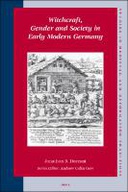Explore

Witchcraft, Gender and Society in Early Modern Germany
Jonathan B. Durrant
2007
0 Ungluers have
Faved this Work
Login to Fave
Using the example of Eichstätt, this book challenges current witchcraft historiography by arguing that the gender of the witch-suspect was a product of the interrogation process and that the stable communities affected by persecution did not collude in its escalation. Readership: All those interested in the history of witch persecution, gender history, the history of the Catholic Reformation, and the history of early modern Germany.
This book is included in DOAB.
Why read this book? Have your say.
You must be logged in to comment.
